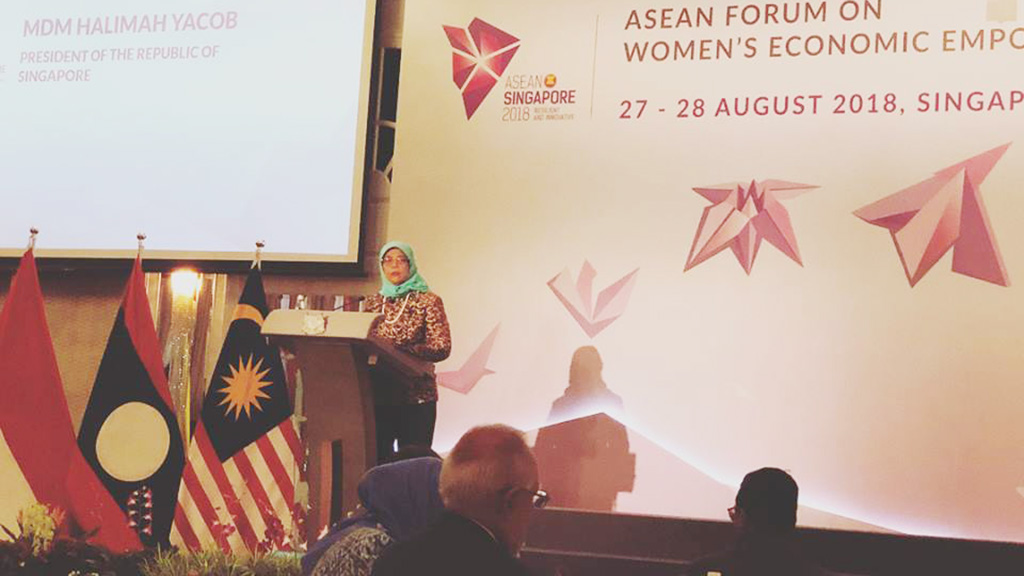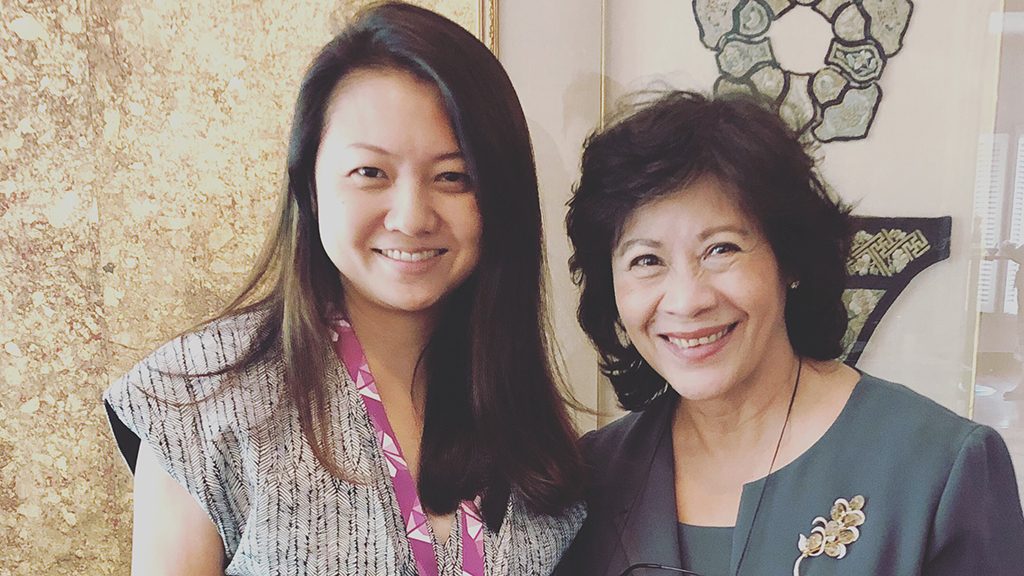Connected Women At The ASEAN Forum On Women’s Economic Empowerment
 Contributed by
Louisa Lee
September 4, 2018
Contributed by
Louisa Lee
September 4, 2018

“As women, we must stand up for ourselves. As women, we must stand up for each other. As women, we must stand up for justice for all.” – Michelle Obama
Ever since I was made Board Member of Connected Women Singapore, it has led me on a path that I had never expected to embark on. I first had the privilege of attending the Singapore Council of Women’s Organisations (SCWO) AGM and elections in June 2018. It is amazing to know of the number of women’s organisations available in Singapore seeking to represent women from different walks of life and ages. I now see it as my duty to continue to understand the goals of each organisation and seek out partnership opportunities with those whose goals are aligned to Connected Women’s.
This year, Singapore takes Chairmanship of ASEAN. To commemorate this, the ASEAN Commission on the promotion and protection of the rights of Women and Children (ACWC) and the ASEAN Intergovernmental Commission on Human Rights (AICHR) jointly organised a Forum on Women’s Economic Empowerment – Building Resilience and Harnessing Innovation. The forum was also supported by the Ministry of Social and Family Development and the Ministry of Foreign Affairs, Singapore.
More than 200 delegates from all 10 ASEAN member countries and Singaporeans from civil societies and educational institutions attended this forum, and through the SCWO, Connected Women was also invited. Guest-of-Honour was Singapore’s first female President Mdm Halimah Yacob, who delivered the keynote on the importance of building an inclusive and enabling ASEAN community.
The forum comprised five sessions, namely, Empowering Female Employees at the Workplace; Breaking Barriers and Re-inventing Traditional Businesses; Creating New Businesses in Emerging Industries; Shaping Corporate Culture for Women Leadership Development; and Empowering Women in the Silver Economy.
The most memorable speech for me was the one delivered by Dr Noeleen Heyzer, Social Scientist and Former Under-Secretary-General of the United Nations. She was the first woman to serve as the Executive Secretary of the United Nations Economic and Social Commission for Asia and the Pacific (ESCAP) since its founding in 1947. She was also the highest ranking Singaporean in the UN system.
She highlighted that it will take 217 years for the disparity of pay for men and women to end. Women have been earning less not because of gender differences but because many are working in non-paid or part-time areas. For those who are employed, they often work in informal sectors. Dr Noeleen calls for moves to remove constraints faced by women entrepreneurs. So far, they hear concentrated in micro businesses which yield low value. Women still face lack of access to resources and finance. While there are micro loans, this locks them in micro businesses. There needs to be diversity in financing models, and for this, we need government and private entities to support – in terms of policies, legal framework and financial arrangement. Complicated, costly and time-consuming procedures need to be removed. Women also suffer from time poverty as caregiving duties for the children and the elderly often fall on the shoulders of women. There needs to be affordable childcare and elderly care services, along with flexi-care arrangements. We need to start envisioning what the 21st-century workplace will look like.
Dr Noeleen also believes that we need to leverage on the changing global and digital economy. In the face of disruptive technological innovations such as the Internet of things, big data, and cloud technology and the emergence of a green economy, we must ensure that these forces come as benefit women and the working poor in the rural and urban areas. Better access to the internet will transform businesses, as they will allow SMEs to access new markets, improve their business processes and provide new products. In the future, more will be accessing the Internet vis the mobile technology and it has been projected that by 2020, nearly 800 million new mobile subscribers will come online in Asia alone. The barriers are indeed reduced. And this is where I truly see the important role Connected Women plays – in driving technology adoption by women-led businesses and start-ups.
 At the ASEAN Forum of Women’s Economic Empowerment with Dr Noeleen Heyzer.
At the ASEAN Forum of Women’s Economic Empowerment with Dr Noeleen Heyzer.
So how can we ensure that women entrepreneurs can benefit from this revolution? Currently, there is a gender divide in access to ICT. Data shows that internet use is higher for males than females in almost all age groups in Asia. As more and more small businesses engage in the new frontiers, we need two invest in education, training and professional development for women. We need to ensure that this opportunity also supports the older women too. She also mentioned the importance of bringing about inclusiveness, especially as the workplace is being transformed. As she concluded, she highlighted that we need to share more of our success stories, as well as our best practices, especially in the areas of women leadership and entrepreneurship in ASEAN. This is especially important as the technological disruption is replacing the low skilled jobs, mostly held by women.
She concluded by highlighting one of the many challenges that the UN is very concerned about. While many women are occupying positions of power because of education, there are many women who are still being left behind. As part of the 2030 UN vision in transforming our world, we need to be rooted on the 5P’s – People, Planet, Peace, Prosperity, and Partnership.
Her concluding remark left the deepest impression – “We have inherited the future from our children and we need to give them something that is inclusive and sustainable.”
We are the leaders, activists, innovators, and visionaries – whether in the public eye or behind the scenes
– who are revolutionising the way people think and live. We are #ConnectedWomen.
Join the Connected Women community now, it’s free!










Sorry, the comment form is closed at this time.